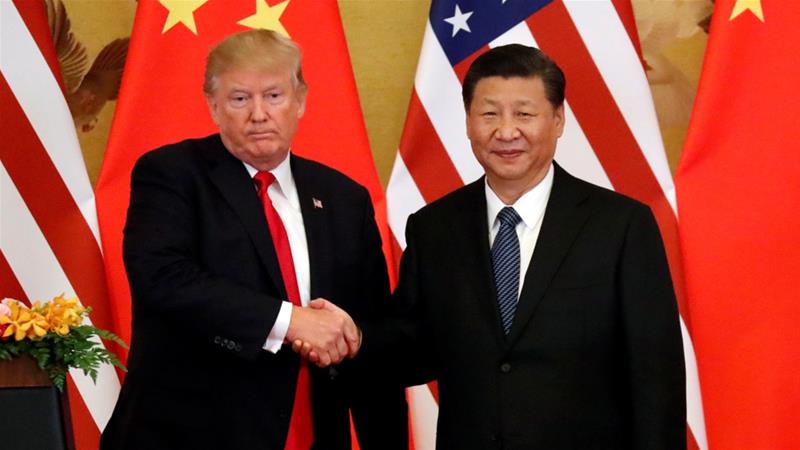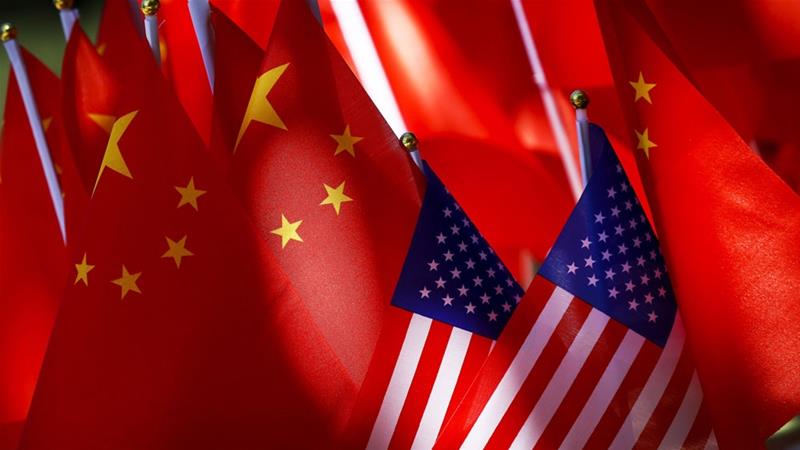China to increase tariffs on $60bn worth of US goods
Beijing will increase tariffs on a total of 5,140 American products from June 1 as the trade war with the US escalates.
Deepening a trade battle and sending financial markets into a tailspin, China announced Monday it was raising tariffs on $60bn of US goods after the latest increase in American tariffs on its exports.
The move comes after the United States escalated the bitter trade war with a tariff hike on $200bn of Chinese products on Friday.
China will impose tariffs on a total of 5,140 US products from June 1, the finance ministry said in a statement.
“China’s adjustment on additional tariffs is a response to US unilateralism and protectionism,” the ministry said. “China hopes the US will get back to the right track of bilateral trade and economic consultations and meet with China halfway.”
The retaliatory measures were announced about an hour after US President Donald Trump tweeted directly to Chinese President Xi Jinping.
Thousands affected
China’s finance ministry said the new penalty duties of 5 percent to 25 percent will affect thousands of US products – including batteries, spinach and coffee.
That followed Trump’s increase on Friday of duties on $200bn of Chinese imports from 10 percent to 25 percent after alleging that China backtracked on commitments it made in earlier negotiations in a dispute over Beijing’s technology ambitions and perennial trade surplus.
Trump started raising tariffs last July over complaints China steals or pressures companies to hand over technology.
Washington wants Beijing to roll back government support for Chinese companies striving to become global leaders in robotics and other technology. The US and other trading partners say such efforts violate Beijing’s free-trade commitments.
Trump has also threatened to slap tariffs on $325bn worth of other Chinese products.
“Investors are increasingly worried an anticipated second-half profit rebound may now evaporate as President Trump’s threat to tariff the remaining $325bn in Chinese imports would disproportionately target consumer products like iPhones, thereby posing a greater threat to the consumption-driven US economy,” said Young.
Global shockwaves
The editor of the Communist Party-owned Chinese newspaper Global Times said on Twitter that Beijing was considering additional actions, including dumping US treasuries, ending US agricultural purchases, and reducing orders for Boeing planes.
Boeing shares fell 3.4 percent. A spokesman for the company said it was “confident the US and China will continue trade discussions and come to an agreement that benefits both US and Chinese manufacturers and consumers”.
But some analysts weren’t as confident.
“The reality is that while trade talks are expected to resume in Beijing, no date has been set and that should tell us a lot about how strained relations are,” said Kristina Hooper, chief global market strategist at Invesco in New York.
The new tariffs are likely to hurt exporters on both sides, as well as European and Asian companies that trade between the US and China or supply components and raw materials to their manufacturers.
The increases already in place have disrupted trade in goods from soybeans to medical equipment and sent shockwaves through other Asian economies that supply Chinese factories.
Recovery path?
Forecasters have warned the US tariff hikes could disrupt a Chinese recovery that had appeared to be gaining traction. Growth in the world’s second-largest economy held steady at 6.4 percent over a year earlier in January-March, supported by higher government spending and bank lending.
The tensions “raise fresh doubts about this recovery path”, Morgan Stanley economists Robin Xing, Jenny Zheng and Zhipeng Cai said in a report.
The latest US charges could knock 0.5 percentage points off annual Chinese economic growth and that loss could widen to one percentage point if both sides extend penalties to all of each other’s exports, economists say. That would pull annual growth below six percent, raising the risk of politically dangerous job losses.
The latest China-US talks ended with no word of progress on Friday.
Trump might meet Xi during next month’s meeting of the Group of 20 major economies in Osaka, Japan, his economic adviser Larry Kudlow said on Sunday.
He also admitted for the first time that American consumers and businesses pay for the tariffs, something Trump has repeatedly denied. “Both sides will pay,” Kudlow told Fox News.
Inside Story
Can the US and China resolve their differences?
Source: Read Full Article




